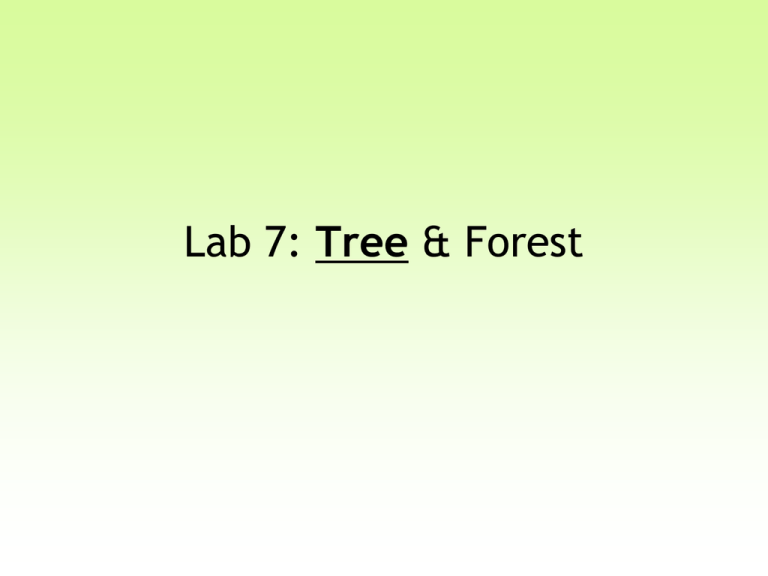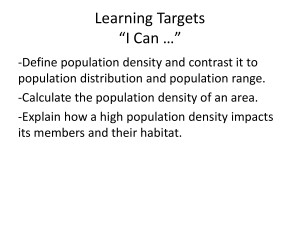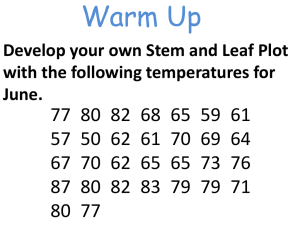Lab 7
advertisement

Lab 7: Tree & Forest Drawing a Forest Created by Emily Hill & Jerry Alan Fails Drawing a Forest Step 1: Create classes for Rectangle & Triangle (done) Step 2: Create a Tree class that can draw a tree at any: x, y position; width, height; color Step 3: Create a Forest class with at least 3 Trees Created by Emily Hill & Jerry Alan Fails Step 2: Tree class • Create a new Tree class • Has 2 fields: a triangle for the top & a rectangle for the trunk • Has 3 constructors: – Default – One with 4 parameters: x, y, width, & height – One with 6 parameters: x, y, width, height, topColor, trunkColor • Getters/setters for topColor, trunkColor • Has a public setBounds method that takes: x, y, width, height – (Might want to add this method to Triangle and Rectangle, but you don’t need to as you can use setX, setY, setWidth, and setHeight) – Tree should start at x, y and extend to width & height – Top and trunk should be relative to one another and to size of tree: • Trunk 1/4 height of tree, 1/5 width • Top 3/4 height of tree, full width • Has a paintComponent method that has a Graphics parameter and calls the corresponding paintComponent methods for the 2 fields • Test: add Tree(s) to Picture class, use different constructors, change the size of the Tree in the constructor or init method and Created by Emily Hill & Jerry Alan Fails test that it works Step 3: Forest class • • • • Create a new Forest class Has at least 3 Tree fields Has a constructor that takes 4 parameters: x, y, width, height Has a draw method that has a Graphics parameter and calls the corresponding draw methods for the 3 fields • Test: replace Tree field in Picture with a Forest • Modify position/sizes in PictureApplet.init() or the Picture constructor • Look at how easy it is to aggregate components! Created by Emily Hill & Jerry Alan Fails Homework • Finish lab exercise (due after exam) Created by Emily Hill & Jerry Alan Fails General Review • • • • • Lecture notes Class exercises Labs CodingBat Chapters 1-4 – Where • Chapter 1 • Chapter 2 • Chapter 3 (except 3.7-3.8, 3.10-3.11) • Chapter 4 (except 4.8-4.9) – What: • Key concepts • Concept summary • Section headings • For extra help look at the exercises Chapter 1: Computer Basics • • • • • • Computer processing Hardware components Networks The Java programming language Program development Object-oriented programming Chapter 2: Data & Expressions • • • • • • • Character strings Variables and assignment Primitive data types Expressions Data conversions Interactive programs – the Scanner class Graphics, Applets, drawing shapes Chapter 3: Using Classes and Objects • • • • Creating objects The String class Packages – import, Java API Classes: Random, Math Chapter 4: Writing Classes • Classes and objects • Anatomy of a class – Three main components of a class – What each item does – How to write it in code • Encapsulation







